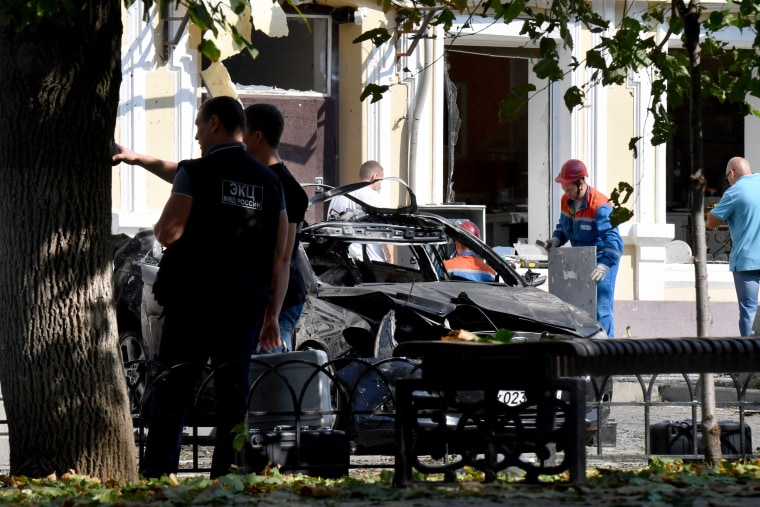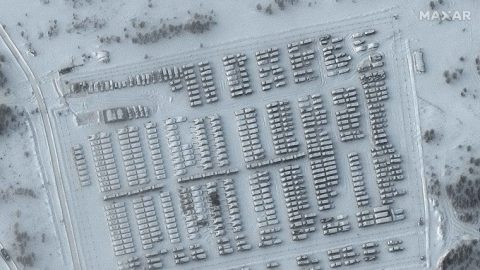From mysterious explosions at military bases to derailed trains to brazen assassinations, Russia has been hit by a mounting stream of sabotage and covert killings in recent months.
Russia has accused Ukraine of orchestrating the attacks — and sometimes Kyiv has taken credit for them.
Facing a stalemate on the battlefield and uncertainty about the long-term prospects for Western military aid, Ukraine increasingly sees sabotage as a crucial tactic against its larger foe.
To put pressure on the Kremlin and disrupt supply lines, Ukraine will likely ramp up its drone strikes and sabotage in the new year, Western officials, former U.S. intelligence officers and regional analysts say.
“I think we’re going to see more of those kind of operations,” said one Western official.
The audacious sabotage campaign has caused unease in the Biden administration, particularly operations that endanger civilians and carry the risk of prompting Moscow to escalate the war beyond Ukraine.
U.S. officials have made it clear that Washington has had no role in the attacks on Russian territory and that Kyiv has abided by a pledge not to use U.S.-made weapons inside Russia.
“Our position on these remains the same; we do not enable or encourage attacks inside of Russian territory,” said a White House National Security Council spokesperson.
But with Ukraine facing growing headwinds in Washington and in Europe as it tries to secure more military and economic aid to carry on its fight, officials in Kyiv may be less willing to heed advice from their U.S. counterparts to refrain from more aggressive covert operations, former intelligence officials said.
“The less aid we provide, the less leverage we have,” said Marc Polymeropoulos, a former career CIA officer.
Ukraine’s shadow war behind Russia’s front lines is in part a legacy of U.S. and British training and assistance over the past decade.
After Russia first sent troops into Ukraine in 2014, Washington cultivated cooperation with Ukraine’s intelligence services and helped train and shape the GUR, the country’s military intelligence service, former U.S. officials said.
“It’s the main entity that the (U.S.) intelligence community trained for years and it grew into a really effective force. They’re our baby,” said Polymeropoulos.
The GUR is now at the forefront of the sabotage offensive. The agency’s director, Kyrylo Budanov, has often taunted Moscow in his public statements. Ukrainian officials say his wife, Marianna, was poisoned last month with “heavy metals” and treated at a hospital.
Ukraine has stepped up its drone strikes behind Russian lines in recent weeks, targeting sites in Moscow, southern Russia and Russian-occupied Crimea. On Dec. 15 and 16, Ukraine launched more than 80 drones at Russian targets, according to Russian officials quoted in local media.

Ukraine has tried to disrupt Russia’s logistical network, targeting rail lines, roads, warehouses and oil depots with drones and other methods deep inside Russian territory.
The covert operations involve a secretive network of partisans that have struck at far-flung locations, former U.S. officials say.
Last month, Russian authorities said suspected sabotage caused a freight train with 19 wagons to derail in the Ryazan region in central Russia. The same day, an explosion and a fire were reported at a gunpowder factory in Kotovsk in the Tambov region, in another incident of suspected sabotage.
Initially cryptic or silent about Ukraine’s possible role in the attacks, government officials in Kyiv have been increasingly vocal in claiming responsibility. The director of Ukraine’s SBU intelligence service, Vasyl Malyuk, has said publicly that his agency was behind two high-profile attacks on the Kerch Strait bridge linking Russia’s mainland to the Russian-occupied Crimean peninsula. One attack involved a truck laden with explosives and another featured sea drones. Both strikes temporarily halted traffic on the span.
The most spectacular act of sabotage in the Ukraine war came in September last year, when an explosion 260 feet under the Baltic Sea ripped apart the Nord Stream II natural gas pipeline between Russia and Germany.
Ukraine has denied responsibility, despite some media reports linking Kyiv to the blast and Russian government accusations. A Swedish prosecutor in April said that the culprit was likely a government actor and not a private group.
For Ukraine, sabotage carries both a psychological and practical effect, as it not only hampers Russia’s military logistics but also could sow anxiety among Russia’s elite, according to Dmitri Alperovitch, chairman of Silverado Policy Accelerator, a nonprofit focused on advancing American global leadership.
“The war ends when Putin decides the war ends,” Alperovitch said.
Ukraine has “to think about how do you break the will of the Russian leadership to continue supporting that war,” he said.
“And that means an asymmetric fight that brings the war to Russian territory … to make everyday life painful for the Russian elites, which today do not feel this war,” he said.
A shortage of shells
Despite U.S. and European weapons and training, Ukraine has struggled to roll back Russian forces in a grinding and bloody fight in the country’s east and south, where Russian troops are operating from heavily defended positions.
Ukraine likely lacks the manpower and resources to wage a successful conventional ground war against Russia and will have to rely on unconventional methods to avoid burning through its supply of troops and ammunition, military experts say.
A Ukrainian army general told Reuters this week that with foreign assistance in doubt, Ukrainian troops now face shortages of artillery shells and have had to scale back some operations.
But in the Black Sea, Ukraine has scored successes against Russia’s navy, sinking or damaging more than two dozen ships, even though Kyiv has a tiny navy.
Employing sea drones and missiles, the Ukrainian operation in the Black Sea has upended conventional wisdom about naval power and could serve as a model for Ukraine’s future sabotage efforts in the next stage of the war, Western officials and experts said.
Ukrainian navy spokesperson Dmytro Pletenchuk called the Black Sea attacks “a new type of naval warfare” that had forced Russia to shift its naval forces to positions more distant from Ukraine’s coast.
The drone assault on Russian naval ships has kept Ukraine’s vital port at Odessa open, albeit at much lower capacity.
To step up its sabotage campaign against Russia, Ukraine will need longer-range drones that can carry larger explosives, analysts say. Given that the U.S. and NATO allies are not ready to provide Ukraine with weapons that could be employed in Russia, Ukraine is seeking to bolster its own defense industry to produce the drones and missiles it needs.
Ukraine already produces its own drones and the Neptune anti-ship missile, which have proven effective in the war.
Ukrainian officials say they are working on an improved version of the Neptune missile with a longer range and drones that can better exploit artificial intelligence, an effort they say will help determine the outcome of the conflict.
In May, Ukraine managed to fly two drones just over the roof of the Kremlin, in a symbolic but embarrassing episode for the Russian regime.
Killed at close range
Apart from targeting Russian military supply networks and Russian warships, Ukraine also has pursued an aggressive assassination campaign.
Ukraine has targeted Russian officials and alleged collaborators, sometimes confirming that its spy agencies had killed them. Earlier this month, Ukraine said the SBU intelligence service gunned down a former Ukrainian lawmaker, Ilya Kiva, 46, near Moscow. Kiva had defected to Russia and had called for Kyiv to surrender to Russian troops after the February 2022 invasion of Ukraine.
“The liquidation of the top-ranking traitor, collaborator, and propagandist Ilya Kiva is a special operation of the SBU. The criminal was eliminated using firearms,” a Ukrainian law enforcement officer familiar with the matter told NBC News afterward.
In August 2022, Russia accused Ukraine of killing Daria Dugina, the daughter of the Russian nationalist Alexander Dugin, who was believed to be the real target in a car bombing attack near Moscow.
Ukraine denied responsibility for the killing.
The assassinations appeared aimed at sending a message that there is no safe haven for enemies of Ukraine.
Michael Vickers, one of the architects of the covert American operation that helped force the Soviets out of Afghanistan in the 1980s, said the most effective sabotage campaigns require a massive, sustained effort and often reinforce conventional military operations.
“You can set someone back for a while, but it’s not permanent. And to really be decisive, you need to achieve sufficient scale,” said Vickers, who recently published a memoir of his years at the CIA and the Pentagon, “By All Means Available.”
Drone strikes in Moscow or other far-flung locations are mainly of “symbolic importance,” Vickers said. “They can hit them with UAVs (unmanned aerial vehicles) and other things but that’s not going to be decisive,” he said.
“In this case, where you’re fighting a big conventional war, the operations really need to be linked to your main effort,” he said.








Recent Comments